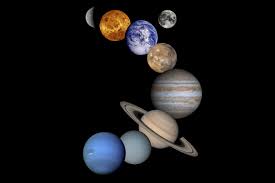Unveiling the Mysteries of Our Solar System: A Journey Through Space
by twib

The Solar System: A Fascinating Journey Through Space
The solar system, our cosmic neighbourhood, is a wondrous expanse that never ceases to amaze us with its beauty and complexity. Comprising the sun, eight planets, numerous moons, asteroids, comets, and other celestial bodies, the solar system offers a glimpse into the vastness of space and the mysteries that lie beyond.
The Sun: Our Radiant Star
At the heart of the solar system is the sun, a dazzling ball of hot plasma that provides light and warmth to all the planets orbiting around it. With a diameter of about 1.4 million kilometres, the sun is a giant among stars, exerting gravitational influence over everything in its domain.
The Planets: Diverse Worlds Waiting to be Explored
Mercury, Venus, Earth, Mars, Jupiter, Saturn, Uranus, and Neptune – these are the eight planets that make up our solar system. Each planet has its own unique characteristics and features, from Mercury’s scorching temperatures to Neptune’s icy blue hues. The study of these planets has revealed insights into planetary formation and evolution.
Moons and Other Celestial Bodies
Besides planets, the solar system is home to a myriad of moons orbiting around them. Moons like Earth’s Moon or Jupiter’s Ganymede offer valuable opportunities for scientific exploration and potential habitats for future space missions. In addition to moons, asteroids and comets also populate our cosmic backyard, each holding clues to our solar system’s history.
Exploration and Discovery
Humanity’s fascination with the solar system has led to numerous space missions aimed at uncovering its secrets. From NASA’s Voyager probes journeying beyond our solar system to Mars rovers exploring the red planet’s surface, each mission expands our understanding of space and pushes the boundaries of scientific knowledge.
The Future of Solar System Exploration
As technology advances and our thirst for discovery grows stronger, we can expect even more exciting developments in solar system exploration. Plans for manned missions to Mars, robotic explorers venturing further into outer space – these are just some of the possibilities that await us in the future.
In conclusion, the solar system stands as a testament to the wonders of our universe. Its beauty and complexity serve as a reminder of how much we have yet to learn about the cosmos that surrounds us. By continuing to explore and study our cosmic neighbourhood, we pave the way for new discoveries that will inspire generations to come.
Frequently Asked Questions About the Solar System: Planets, Numbers, Order, and Temperature
- What are the 12 planets called?
- Are there 8 or 9 planets in the solar system?
- What is the order of the 9 planets?
- Which planet is the hottest?
What are the 12 planets called?
In the realm of astronomy, the question of what the 12 planets are called often arises. It’s important to note that as of current scientific understanding, our solar system consists of eight recognized planets: Mercury, Venus, Earth, Mars, Jupiter, Saturn, Uranus, and Neptune. In addition to these eight planets, there are also five dwarf planets in our solar system: Pluto, Ceres, Haumea, Makemake, and Eris. While these dwarf planets exhibit characteristics similar to planets, they do not meet the criteria set by the International Astronomical Union to be classified as full-fledged planets. This distinction highlights the dynamic nature of planetary classification and the ongoing exploration and discovery within our cosmic neighbourhood.
Are there 8 or 9 planets in the solar system?
One of the frequently asked questions about the solar system is whether there are 8 or 9 planets in it. The answer to this question has evolved over time due to changes in scientific classification. In the past, Pluto was considered the ninth planet in our solar system. However, in 2006, the International Astronomical Union redefined the criteria for what constitutes a planet, leading to Pluto being reclassified as a “dwarf planet.” As a result, there are now officially eight recognized planets in our solar system: Mercury, Venus, Earth, Mars, Jupiter, Saturn, Uranus, and Neptune. This change highlights the dynamic nature of scientific discovery and classification processes.
What is the order of the 9 planets?
The order of the nine planets in our solar system, starting from the closest to the sun, is Mercury, Venus, Earth, Mars, Jupiter, Saturn, Uranus, and Neptune. It’s important to note that Pluto was reclassified as a dwarf planet in 2006 by the International Astronomical Union and is no longer considered one of the main planets in our solar system. Each planet has its own unique characteristics and orbits the sun in a specific position relative to the others, creating a fascinating celestial dance that has captivated astronomers and space enthusiasts for centuries.
Which planet is the hottest?
In the solar system, the title of the hottest planet goes to Venus. Despite not being the closest planet to the sun (that title belongs to Mercury), Venus’s thick atmosphere traps heat, creating a runaway greenhouse effect. This results in surface temperatures that can soar up to a scorching 467 degrees Celsius, making it hotter than even Mercury. The extreme heat on Venus is a fascinating aspect of this enigmatic planet, showcasing the diverse and extreme conditions found within our celestial neighbourhood.
The Solar System: A Fascinating Journey Through Space The solar system, our cosmic neighbourhood, is a wondrous expanse that never ceases to amaze us with its beauty and complexity. Comprising the sun, eight planets, numerous moons, asteroids, comets, and other celestial bodies, the solar system offers a glimpse into the vastness of space and the…
Latest articles
- Embracing the Legacy: Ireland Rugby’s Enduring Passion and Pride
- The Cricketing Genius of Kane Williamson: A True Maestro of the Game
- Kate Abdo: A Trailblazer in Sports Broadcasting
- Julius Randle: A Rising Star in the Australian Basketball Scene
- Artists Unveiled: Celebrating Creativity and Expression
